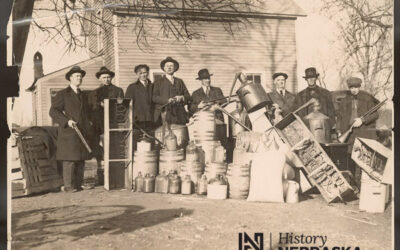The gradual transition from horse to tractor power on Nebraska farms was well underway by 1916 for many reasons. Horses were expensive to buy, feed, and maintain. Farmers needed about five acres of land to grow the oats, hay, and fodder that each horse needed for the year. In contrast, if a tractor didn’t work, it didn’t need fuel. Land that had been reserved for supporting animals could be plowed under for cash crops to help pay for the loan it took to buy the tractor. Tractors could be operated day and night and were not affected by temperature, disease, or insects. The Nebraska Farmer of January 12, 1916, included a letter from J. H. Ratcliff of Hitchcock County, who praised the new machine and compared it favorably to horses:
“The tractor engine has come to stay. It does its work thoroughly and effectively, does not become tired with twelve or fourteen hours of steady work in the hot sun and there is no danger of colic from watering or feeding at the end of a hard day’s work. In fact, the tractor does not have to be fed or watered at all at the end of the day’s work, nor does it require any care or expense until it starts on the next day’s work. The small engine is for the small farm and the large one for the large farm. I think the prospective buyer should be very careful in selecting a tractor; he should buy the kind that has been tested thoroughly and is fully warranted and backed by a reliable company.”
Elsewhere in the same issue, Ira Nichols of Buffalo County wrote, “I have just finished reading the letters about tractors for farm work in the New Year number of The Nebraska Farmer. Great claims are made that more work can be done with the tractor, especially plowing. I say stick to the horse. Suppose that one tractor does do the work of eight horses, who ever bought a tractor, used it two or three years, and then sold it for more or as much as he paid for it? Hands up! Now, who ever bought or raised horses, used them a few years and then sold them for more than they cost? Hands up again!
“How do tractors compare with horses on wet ground? Tractors usually depreciate in value in proportion to the amount of work they do, while horses usually increase in value. Horses are money makers and they will do the work, too, if you will give them time and feed. Horses get their strength and power from feed raised on the farm, while the tractor’s power is from a fluid called ‘gasoline,’ the price of which is 25 cents a gallon and is still rising. Farmers are losing too much money on machinery. The automobile and tractor craze will be over in a few years and then we will be wishing for more horses or mules. . . .
“In conclusion I say stick to the horse, for he’ll make you more money in the long run; besides, he will be hauling your tractors to the junk heap in a few years. Possibly you mortgaged these same horses to buy the tractor, and about half of that mortgage is still unpaid.”



